
Goslar is a historic town in Lower Saxony, Germany. It is the administrative centre of the district of Goslar and is located on the northwestern slopes of the Harz mountain range. The Old Town of Goslar and the Mines of Rammelsberg are UNESCO World Heritage Sites for their millenium-long testimony to the history of ore mining and their political importance for the Holy Roman Empire and Hanseatic League. Each year Goslar awards the Kaiserring to an international artist, called the "Nobel Prize" of the art world.

The Eichsfeld ; 'Oak-field') is a historical region in the southeast of the state of Lower Saxony and northwest of the state of Thuringia in the south of the Harz mountains in Germany. Until 1803 the Eichsfeld was for centuries part of the Archbishopric of Mainz, which is the cause of its current position as a Catholic enclave in the predominantly Protestant north of Germany. Following German partition in 1945, the West German portion became Landkreis Duderstadt. A few small transfers of territory between the American and Soviet zones of occupation took place in accordance with the Wanfried Agreement.

Edelgard Bulmahn is a German politician from the Social Democratic Party of Germany (SPD). She served as Member of the German Bundestag between 1987 and 2017. She was Federal Minister of Education and Research from 1998 to 2005. From 2013 until 2017 she was elected as one of the Vice Presidents of the Bundestag.
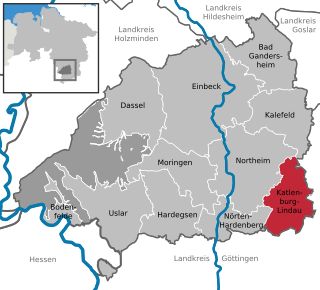
Katlenburg-Lindau is a municipality in the Landkreis (district) of Northeim in Lower Saxony, Germany. It is situated approximately 10 km southeast of Northeim, and 20 km northeast of Göttingen. Katlenburg-Lindau was formed on 1 March 1974 from the formerly independent communities of Katlenburg-Duhm, Gillersheim, Berka, Elvershausen, Wachenhausen, Suterode and Lindau. With the exception of Lindau, which had belonged Landkreis Duderstadt, these communities were part of Landkreis Northeim. The Max Planck Institute for Solar System Research of the Max Planck Society was located in Lindau from 1946 to 2014, when it was moved to Göttingen. Until June 2004 the MPI was known as "Max-Planck-Institut für Aeronomie".
Lindau is a village in the southern Lower Saxon section of the Eichsfeld, Germany. Lindau belongs to the Gemeinde (municipality) of Katlenburg-Lindau and to the Landkreis (district) of Northeim. The village is known to many space physicists and radio engineers around the world, as the Max Planck Institute for Solar System Research was based there until 2014, when it moved to Göttingen, also in Lower Saxony.

The B 241 is a federal road (Bundesstraße) in Germany.

Kirsten Lühmann is a German politician of the Social Democratic Party (SPD), deputy federal chairwoman of the German Civil Service Federation and, since the German federal elections of 2009, a member of parliament for the SPD.
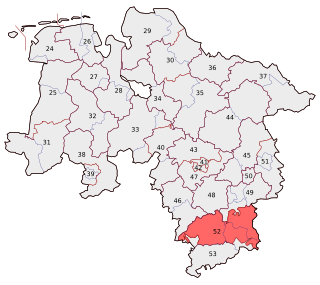
Goslar – Northeim – Osterode is an electoral constituency represented in the Bundestag. It elects one member via first-past-the-post voting. Under the current constituency numbering system, it is designated as constituency 52. It is located in southern Lower Saxony, comprising most of the districts of Goslar, Northeim, and the former Osterode.

Luise Amtsberg is a German politician of Alliance 90/The Greens who has been a member of the German Bundestag since the federal election in 2013. She contested the constituency of Kiel in 2013 and 2017.
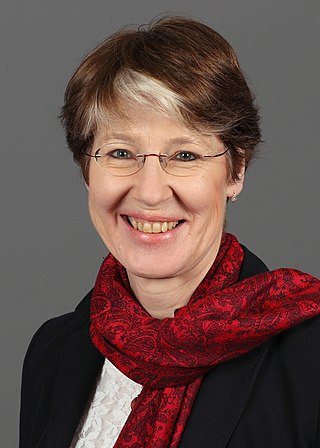
Ulrike Renate Martina Bahr is a German politician of the Social Democratic Party (SPD) and since 2013 MP in the Bundestag. She belongs to the left party wing of the SPD, the Parliamentary Left. Between 2018 and 2019, she was one of the members of the SPD parliamentary group who voted most often against the party line.
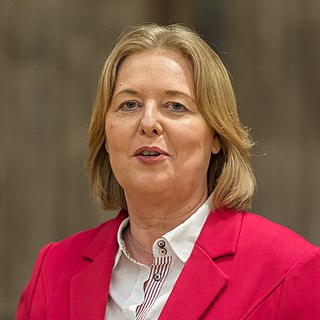
Bärbel Bas is a German politician of the Social Democratic Party (SPD) who has served as the President of the Bundestag since 2021. She has been a member of the German Bundestag since the federal election in 2009. She served as the deputy chairwoman of the SPD parliamentary group under the leadership of chairman Rolf Mützenich from 2019 to 2021.
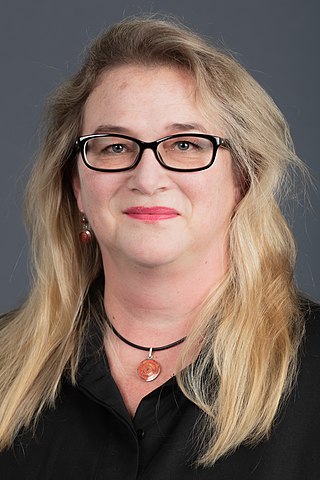
Katrin Budde is a German politician of the Social Democratic Party (SPD) who has been serving as a member of the Bundestag from the state of Saxony-Anhalt since 2017.

Daniela De Ridder is a German-Belgian politician of the Social Democratic Party (SPD) who has served as a member of the Bundestag from the state of Lower Saxony from 2013 until 2021 and again since May 2022.

Svenja Stadler is a German politician of the Social Democratic Party (SPD) who has been serving as a member of the Bundestag from the state of Lower Saxony since 2013.

Marja-Liisa Völlers is a German teacher and politician of the Social Democratic Party (SPD) who has been serving as a member of the Bundestag from the state of Lower Saxony since 2017.

Dunja Eleonore Angelika Kreiser is a German lawyer and politician of the Social Democratic Party (SPD) who has been serving as a member of the Bundestag since 2021.

Mareike Lotte Wulf is a German politician (CDU) and has been a member of the German Bundestag since 2021. From 2017 to 2021, she was a member of the Lower Saxony state parliament.

Andreas Milan Gerhard Philippi is a German surgeon and politician of the Social Democratic Party (SPD) who has been serving as State Minister of Social Affairs, Labour, Health and Equality in the government of Lower Saxony since 2023. He previously was a member of the Bundestag from the state of Lower Saxony from 2021 to 2022.

Zanda Martena is a Latvian-German politician of the Social Democratic Party (SPD) who has been serving as member of the Bundestag, since 2021. She is a full member of the Legal Affairs Committee and committee chair of the European Law Subcommittee.
Anke Hennig is a German politician for the SPD and has been a member of the Bundestag, the federal diet since 2021.


















